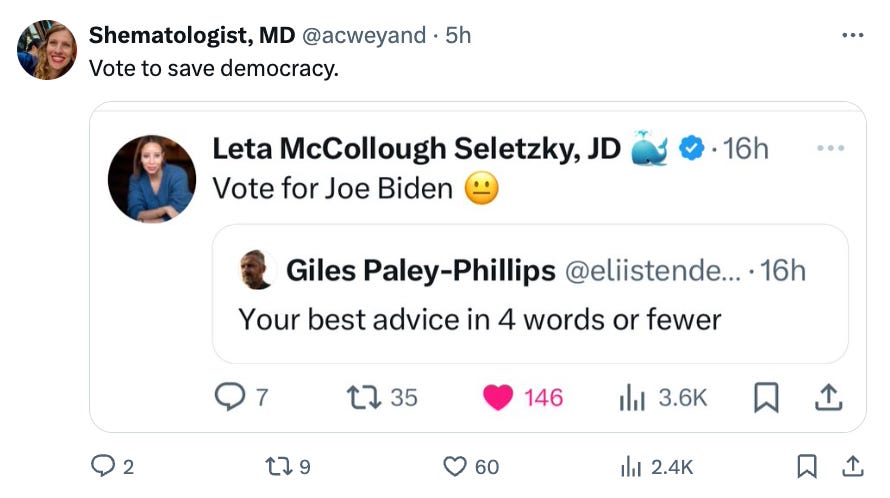Should doctors encourage patients to vote?
5 reasons why it is a bad idea
Recently, I saw this tweet that I half agreed with.
She is right! Doomscrolling and getting angry accomplishes nothing. It’s the rest I wonder about.
The idea that doctors— particularly hematologist oncologists (in this case a pediatric heme onc doctor based in the purple state of Michigan)— should encourage patients to vote is a claim I have heard more frequently in recent years.
Strangely, I have never heard it from a doctor who is known to vote Republican, but only from doctors known to vote Democrat. How could I possibly know how this doctor plans to vote you ask?
It’s an interesting situation where a doctor— who has only and faithfully tweeted full support for one political party— plans to encourage patients to vote, and give trainees the time to vote.
There are 5 reasons why this is a bad idea
It is can’t be done consistently. Imagine, bringing in your 5 year old with diffuse midline glioma to see the doctor. The child is dying, and the doctor patiently councils the family what to expect in the weeks to come. Everyone’s heart is broken. At the end of the visit, the doctor says and, “after you get your labs, I encourage you to take the time to vote either in person or by mail. It is vital for our democracy.” It would be tone deaf and inappropriate to change the topic like this, and as such, the policy of encouraging voting can never be universal. If not universal, it is biased. Dire illness, socioeconomics and voting have associations.
It forces people to disclose their citizenship or prior felony status. These factors are not relevant to their care, and may undermine the doctor-patient relationship. Ironically the doctor’s political goals (get Biden elected) is clashing with the fundamental liberal principle of health equity and right to privacy. You may say, “well the patient doesn’t have to say their immigration status.” I can assure you, as a doctor who cares for many people with varying immigration statuses, the mere mention the topic can cause concern.
It’s not just “vote”. It is vote for Joe Biden, if we are honest. Inherently, the doctor’s political bias is reflected in the encouragement. What happens if the patient’s father is wearing a MAGA hat. Do you still remind them to vote? Or do you conveniently forget? Perhaps best not to remind *him*.
It is a misuse of the doctor’s powerful role. Imagine there is a conservative resident. (I know, I don’t know how they got in either)— he or she may feel as if they want to avoid the topic with an attending who tweets explicitly to vote for Joe Biden. I strongly suspect conservative students could successfully litigate a medical school for providing an unfair and discriminatory work environment. But regardless, it is a misuse of power.
5. It is just not a priority. Doctors can remind patients to change the battery in the smoke detector, finish their taxes, and vote, but none of these things are a priority. Most clinic visits are already the bare bones (15 mins), and I find it impossible to believe patients and parents have so few concerns that there is time to encourage their parents to vote. Doctors have to prioritize what matters most, and voting just isn’t it.
Doctors are free to encourage people to vote just like any other person standing in front of whole foods with a clipboard, but when I am feeling sick, or worried about my health, I want them to focus on that issue, and I think it is inappropriate to hijack my visit with their political agenda. I am paying after all for those 15 mins. I want the agenda to be about my care.
Doomscrolling and getting angrier accomplishes nothing, but neither does further degrading the medical experience for patients, and putting your own desires (Biden must be re-elected) about their more relevant worries (what do I do for my child dying of diffuse midline glioma).
I find it sad how partisan politics is rotting medicine.








It's none of my doctor's business whether I vote. Also none of her business what my politics are. It's also patronizing and paternalistic for a doctor to assume I care what *her* politics are or have any interest in hearing about them.
If I'm seeing a doctor, I need help with a health issue. This defines the boundaries of our relationship. I'm not a child seeking guidance on how to think, act, or live my life.
Nothing would make me lose confidence more than a doctor pushing a political agenda.